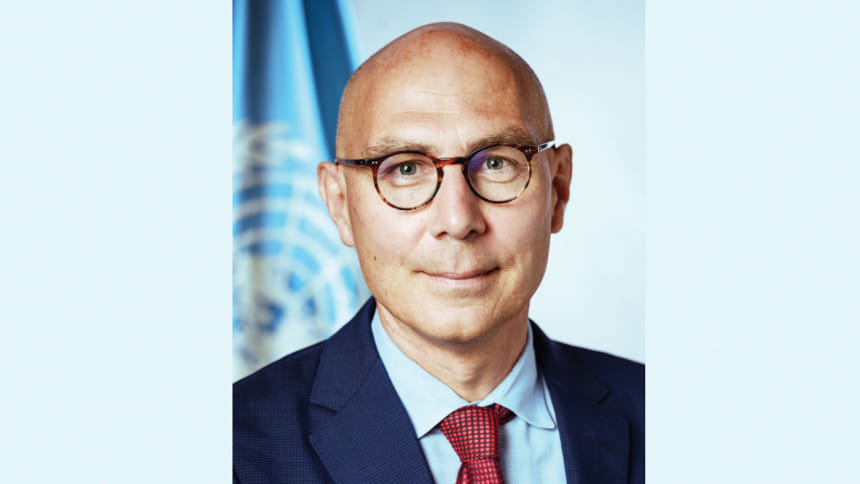All killings, rights abuses must be probed
UN Human Rights Chief Volker Turk yesterday said perpetrators of all human rights violations before and after August 5 must be tried.
“It is not acceptable to have mob justice of any kind and that’s why you need the rule of law. Because otherwise, violence begets violence as we see in so many situations around the world,” he told reporters at a city hotel at the end of his two-day visit to Bangladesh.
He was referring to the people killed before and after the fall of the Awami League government in early August.
Hundreds of people were killed during the mass uprising that led to the ouster of Sheikh Hasina. But after she fled to India, many people, including police and Awami League activists, were killed in retaliation. Besides, there were attacks on minority communities.
A UN fact-finding mission is currently investigating the human rights violations that took place between July 1 and August 15.
During his visit, Turk held meetings with Chief Adviser Prof Muhammad Yunus, Chief Justice Syed Refaat Ahmed, Army Chief General Waker-Uz-Zaman, advisers, civil society members, UN officials, diplomats and Dhaka University students who took part in the July protests.
At least 1,695 murder cases, including 75 against high profile politicians and businesspeople linked to the Awami League, have been filed since the formation of the interim government on August 8.
Many of the cases were filed under the International Crimes Tribunal (ICT) Act, which has a provision of death penalty.
During his meetings with the advisers, Turk said there were issues in the ICT law that needed compliance with international human rights standards.
“Killings, all killings need to be investigated. That’s what human rights demand, because we cannot allow killings to happen with impunity,” Turk said.
Bangladesh needs to establish justice, truth and reconciliation, he said, adding that he was visiting the country to see how his office could provide support to the government during the transition process.
About the government decision that no cases would be filed against people who worked to make the mass uprising a success, he said killings should be properly investigated irrespective of the identity of the perpetrators.
Referring to the large number of cases, he said, “We cannot have the filing of cases on charges that are not properly done and it is therefore extremely important to resolve this and there is a commission set up precisely to address this issue.
“It is important in such a period that we don’t repeat the past, that justice is properly served … which means cases are properly investigated and charges are brought against precisely those who have committed crimes and they are also entitled to fair trial.”
About the ban on Bangladesh Chhatra League under the anti-terrorism law, he said, “The world has seen the consequences of the so-called global anti-terrorism campaign …. Often, people who opposed the authorities were labelled as terrorists.
“We often see labelling of the terrorists to stifle the dissent. It is important to learn lessons from this country in the way terrorism label was used to stifle the dissent.”
The UN fact-finding mission is investigating the attacks on the minorities after August 5.
“Protection of minorities is absolutely key. It is part of the human rights framework. We need to ensure that the reported attacks against minorities are investigated.
“There is also a lot of misinformation and disinformation, which is [why it is] all the more important to go to the facts, to identify the perpetrators.”
The situation in Bangladesh is unique and unprecedented, he said, adding that human rights and social justice are the core demands of the youth.
“Despite the grief and sense of loss, there is palpable hope that this time, through this transition, things will be different. Thus, this time, there must be justice, reforms must be sustainable and durable, so that the abusive practices of the last decades are not repeated.”
He proposed setting up an office of the UN Human Rights Office here to support the transition and promote human rights in areas where reforms are being made.
After meeting Turk, Foreign Adviser Touhid Hossain told a press briefing that the government was examining the UN proposal to set up its office in Bangladesh.
Turk welcomed the steps to repeal the Cyber Security Act, and to withdraw old cases of speech crimes under this law and the Digital Security Act.
Women are at the heart of social justice movements, including the protests in July, and they must be at the forefront during the transition and beyond. The participation of ethnic and religious minorities and indigenous peoples is also crucial, he said.
The reform initiatives can be a powerful step towards easing decades of intense political division.
Criminal cases should not be filed against individuals solely on the basis of their previous political affiliations, Turk added.
Meanwhile, Chief Adviser’s Press Secretary Shafiqul Alam said the UN fact-finding mission would finalise its report in the first week of December.
Turk urged the chief adviser to make the National Human Rights Commission independent and fully functional.
Prof Yunus said his government was committed to upholding the rights of every citizen.
LondonGBDESK//



Comments are closed.